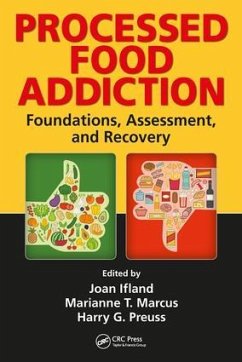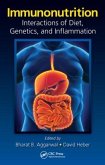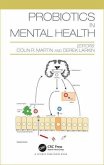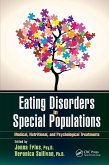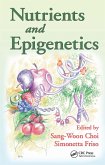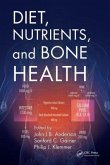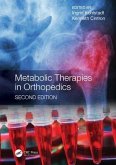Processed Food Addiction
Foundations, Assessment, and Recovery
Herausgeber: Ifland, Joan; Preuss, Harry G; Marcus, Marianne T
Processed Food Addiction
Foundations, Assessment, and Recovery
Herausgeber: Ifland, Joan; Preuss, Harry G; Marcus, Marianne T
- Gebundenes Buch
- Merkliste
- Auf die Merkliste
- Bewerten Bewerten
- Teilen
- Produkt teilen
- Produkterinnerung
- Produkterinnerung
The food addiction model is a new approach to understanding and treating overeating, an epidemic which is worsening with serious consequences. Clinical experience shows that applying classic addiction recovery protocols of withdrawal and abstinence are effective at establishing healthy eating habits.
Andere Kunden interessierten sich auch für
![Immunonutrition Immunonutrition]() Immunonutrition232,99 €
Immunonutrition232,99 €![Probiotics in Mental Health Probiotics in Mental Health]() Probiotics in Mental Health232,99 €
Probiotics in Mental Health232,99 €![Nutrition for Brain Health and Cognitive Performance Nutrition for Brain Health and Cognitive Performance]() Nutrition for Brain Health and Cognitive Performance242,99 €
Nutrition for Brain Health and Cognitive Performance242,99 €![Eating Disorders in Special Populations Eating Disorders in Special Populations]() Eating Disorders in Special Populations253,99 €
Eating Disorders in Special Populations253,99 €![Nutrients and Epigenetics Nutrients and Epigenetics]() Nutrients and Epigenetics242,99 €
Nutrients and Epigenetics242,99 €![Diet, Nutrients, and Bone Health Diet, Nutrients, and Bone Health]() Diet, Nutrients, and Bone Health232,99 €
Diet, Nutrients, and Bone Health232,99 €![Metabolic Therapies in Orthopedics, Second Edition Metabolic Therapies in Orthopedics, Second Edition]() Metabolic Therapies in Orthopedics, Second Edition232,99 €
Metabolic Therapies in Orthopedics, Second Edition232,99 €-
-
-
The food addiction model is a new approach to understanding and treating overeating, an epidemic which is worsening with serious consequences. Clinical experience shows that applying classic addiction recovery protocols of withdrawal and abstinence are effective at establishing healthy eating habits.
Produktdetails
- Produktdetails
- Verlag: CRC Press
- Seitenzahl: 480
- Erscheinungstermin: 9. Februar 2018
- Englisch
- Abmessung: 251mm x 180mm x 30mm
- Gewicht: 1021g
- ISBN-13: 9781498719964
- ISBN-10: 1498719961
- Artikelnr.: 50984201
- Verlag: CRC Press
- Seitenzahl: 480
- Erscheinungstermin: 9. Februar 2018
- Englisch
- Abmessung: 251mm x 180mm x 30mm
- Gewicht: 1021g
- ISBN-13: 9781498719964
- ISBN-10: 1498719961
- Artikelnr.: 50984201
Joan Ifland is the chief executive officer of Food Addiction Training, LLC. She received her BA in economics and political science from Oberlin College, MBA from Stanford University, and PhD in interdisciplinary studies with a specialization in addictive nutrition from the Union Institute & University. She has innovated in the field of recovery from food addiction. She was the first chair of the Food Addiction Council for the American College of Nutrition. She is the author of the popular book Sugars and Flours: How They Make Us Crazy, Sick, and Fat. She founded Victory Meals in Houston, TX, which is the first prepared meal company to provide abstinent meals. She is currently developing online approaches to recovery at www.foodaddictionreset.com as well as the Facebook Group, Food Addiction Education. Her early career was spent at the Wisconsin State Legislature and the Continental Group, Stamford, CT. Marianne T. Marcus is professor emerita at the University of Texas Health Science Center, School of Nursing, Houston, TX. She received her BSN from Columbia University, MA and MEd from Teachers College, Columbia University, and EdD from the University of Houston. Dr. Marcus served as chair of the Department of Nursing Systems, director of the Center for Substance Abuse Prevention, Education and Research, and was the John P. McGovern Distinguished Professor of Addiction Nursing. Her academic focus has been the education of interdisciplinary health professionals to deliver prevention, screening, and treatment services related to substance use disorders. She was the principal investigator for three successive faculty development grants funded by the Center for Substance Abuse Prevention (CSAP) and a federal grant to establish an Addictions Focus graduate subspecialty for nursing. Dr. Marcus' research has focused on therapeutic community treatment for substance use disorders, including an NIH-funded behavioral therapies trial to determine the effect of mindfulnessbased stress reduction on treatment in the therapeutic community setting. She has also conducted CSAP-funded community-based participatory research to test substance abuse prevention in vulnerable communities. Her professional honors include membership in the American Academy of Nursing, the University of Texas Academy of Health Science Education, and the Teachers College Nursing Education Alumni Association Hall of Fame. Harry G. Preuss received his BA and MD from Cornell University, Ithaca, NY, and New York City; trained for three years in internal medicine at Vanderbilt University Medical Center; studied for two years as a fellow in renal physiology at Cornell University Medical; and spent two years in clinical and research training in nephrology at Georgetown University Medical Center. During his training years, he was a special research fellow of the National Institutes of Health (NIH). Following five years as an assistant and associate (tenured) professor of medicine at the University of Pittsburgh Medical Center where he became an established investigator of the American Heart Association, he returned to Georgetown Medical Center. He subsequently performed a six-month sabbatical in molecular biology at the NIH. Dr. Preuss is now a tenured professor in four departments at Georgetown University Medical Center-Biochemistry, Physiology, Medicine, and Pathology.
Introduction: Learning about Processed Food Addiction (PFA)
Part I. Foundation
1. Overlap between Drug and Processed Food Addiction (PFA) - Pamela M.
Peeke, Joan Ifland
2. Neurodysfunction in Addiction and Overeating as Assessed by Brain
Imaging - Randall J. Ellis, Michale Michaelides, Gene-Jack Wang
3. Neural Vulnerability Factors for Overeating: Treatment Implications -
Eric Stice, Zack Stice
4. Sugar Consumption: An Important Example Whereby Recognizing Food
Addiction May Prove Important in Gaining Optimal Health - Harry G
Preuss, Joan R Ifland
5. Sugar and Fat Addiction - Kristen Ciscitelli, Nicole Avena
6. Abstinent Food Plans for Processed Food Addiction (PFA) - J. R.
Ifland,H.G. Preuss, M.T. Marcus, K.M. Rourke, W.C. Taylor, H. Theresa
Wright, K. Sheppard
7. Mindfulness Therapies for Food Addiction - Marianne T. Marcus
Part II. Diagnosis and Assessment
8. Introduction to Part II, Diagnosing and Assessing Processed Food
Addiction (PFA) - Dennis M. Donovan, Joan Ifland
9. Assessment of food cravings -Adrian Meule
10. Case Study: Severe Processed Food Addiction - Natalie Gold
11. DSM 5 SUD Criterion 1. Uninteded Use - Theresa Wright, Joan Ifland
12. Criterion 2. Failure to cut back - Diane Rohrback, Joan Ifland
13. DSM 5 SUD Criterion 3. Time Spent - Elaine Epstein, Joan Ifland
14. DSM 5 SUD Criterion 4. Cravings - Joan Ifland
15. DSM 5 SUD Diagnostic Criterion 5. Failure to fulfil roles - Carrie
Willy, Joan Ifland
16. DSM 5 SUD Diagnostic Criterion 6. Interpersonal Problems - Robin
Piper, Joan Ifland
17. DSM5 SUD Diagnostic Criterion 7. Activities Given Up - Rhona Epstein,
Joan Ifland
18. DSM 5 SUD Diagnostic Criterion 8 Hazardous Use - Jennifer Mason
Cross, Joan Ifland
19. DSM 5 SUD Criterion 9 Use in Spite of Consequences - Sue Roselle,
Joan Ifland
20. DSM 5 SUD Criterion 10 Tolerance - Carrie Willey, Joan Ifland
21. DSM 5 SUD Criterion 11 Withdrawal - Theresa Wright, Joan Ifland
22. The Addiction Severity Index in the Assessement of Processed Food
Addiction - Joan Ifland, Kay Sheppard, Theresa Wright
Part III. Recovery from Processed Food Addiction (PFA)
23. Introduction to Recovery from Processed Food Addiction - Doug
Ziedonis and Joan Ifland
24. Premises of Recovery for Adults - Douglas M. Ziedonis, Joan Ifland
25. Avenues to Success for the Practitioner - Doug Ziedonis and Joan
Ifland
26. Adaptation of APA Practise Guidelines for SUD to Processed Food
Addiciton (PFA) - Carrie Willey, Joan Ifland
27. Preparing Adults for Recovery - Robin Piper, Joan Ifland
28. Insights from the Field - Theresa Wright, Joan Ifland
29. Adaptation of SUD and ED Practise Parameters to Adolescents and
Children with PFA - Joan Ifland, Carrie L. Willey
30. Strategies for Helping Food-Addicted Children - Joan Ifland
31. Conclusion: Nurturing The Sapling - H.G. Preuss, M.T. Marcus, J.
Ifland
Part I. Foundation
1. Overlap between Drug and Processed Food Addiction (PFA) - Pamela M.
Peeke, Joan Ifland
2. Neurodysfunction in Addiction and Overeating as Assessed by Brain
Imaging - Randall J. Ellis, Michale Michaelides, Gene-Jack Wang
3. Neural Vulnerability Factors for Overeating: Treatment Implications -
Eric Stice, Zack Stice
4. Sugar Consumption: An Important Example Whereby Recognizing Food
Addiction May Prove Important in Gaining Optimal Health - Harry G
Preuss, Joan R Ifland
5. Sugar and Fat Addiction - Kristen Ciscitelli, Nicole Avena
6. Abstinent Food Plans for Processed Food Addiction (PFA) - J. R.
Ifland,H.G. Preuss, M.T. Marcus, K.M. Rourke, W.C. Taylor, H. Theresa
Wright, K. Sheppard
7. Mindfulness Therapies for Food Addiction - Marianne T. Marcus
Part II. Diagnosis and Assessment
8. Introduction to Part II, Diagnosing and Assessing Processed Food
Addiction (PFA) - Dennis M. Donovan, Joan Ifland
9. Assessment of food cravings -Adrian Meule
10. Case Study: Severe Processed Food Addiction - Natalie Gold
11. DSM 5 SUD Criterion 1. Uninteded Use - Theresa Wright, Joan Ifland
12. Criterion 2. Failure to cut back - Diane Rohrback, Joan Ifland
13. DSM 5 SUD Criterion 3. Time Spent - Elaine Epstein, Joan Ifland
14. DSM 5 SUD Criterion 4. Cravings - Joan Ifland
15. DSM 5 SUD Diagnostic Criterion 5. Failure to fulfil roles - Carrie
Willy, Joan Ifland
16. DSM 5 SUD Diagnostic Criterion 6. Interpersonal Problems - Robin
Piper, Joan Ifland
17. DSM5 SUD Diagnostic Criterion 7. Activities Given Up - Rhona Epstein,
Joan Ifland
18. DSM 5 SUD Diagnostic Criterion 8 Hazardous Use - Jennifer Mason
Cross, Joan Ifland
19. DSM 5 SUD Criterion 9 Use in Spite of Consequences - Sue Roselle,
Joan Ifland
20. DSM 5 SUD Criterion 10 Tolerance - Carrie Willey, Joan Ifland
21. DSM 5 SUD Criterion 11 Withdrawal - Theresa Wright, Joan Ifland
22. The Addiction Severity Index in the Assessement of Processed Food
Addiction - Joan Ifland, Kay Sheppard, Theresa Wright
Part III. Recovery from Processed Food Addiction (PFA)
23. Introduction to Recovery from Processed Food Addiction - Doug
Ziedonis and Joan Ifland
24. Premises of Recovery for Adults - Douglas M. Ziedonis, Joan Ifland
25. Avenues to Success for the Practitioner - Doug Ziedonis and Joan
Ifland
26. Adaptation of APA Practise Guidelines for SUD to Processed Food
Addiciton (PFA) - Carrie Willey, Joan Ifland
27. Preparing Adults for Recovery - Robin Piper, Joan Ifland
28. Insights from the Field - Theresa Wright, Joan Ifland
29. Adaptation of SUD and ED Practise Parameters to Adolescents and
Children with PFA - Joan Ifland, Carrie L. Willey
30. Strategies for Helping Food-Addicted Children - Joan Ifland
31. Conclusion: Nurturing The Sapling - H.G. Preuss, M.T. Marcus, J.
Ifland
Introduction: Learning about Processed Food Addiction (PFA)
Part I. Foundation
1. Overlap between Drug and Processed Food Addiction (PFA) - Pamela M.
Peeke, Joan Ifland
2. Neurodysfunction in Addiction and Overeating as Assessed by Brain
Imaging - Randall J. Ellis, Michale Michaelides, Gene-Jack Wang
3. Neural Vulnerability Factors for Overeating: Treatment Implications -
Eric Stice, Zack Stice
4. Sugar Consumption: An Important Example Whereby Recognizing Food
Addiction May Prove Important in Gaining Optimal Health - Harry G
Preuss, Joan R Ifland
5. Sugar and Fat Addiction - Kristen Ciscitelli, Nicole Avena
6. Abstinent Food Plans for Processed Food Addiction (PFA) - J. R.
Ifland,H.G. Preuss, M.T. Marcus, K.M. Rourke, W.C. Taylor, H. Theresa
Wright, K. Sheppard
7. Mindfulness Therapies for Food Addiction - Marianne T. Marcus
Part II. Diagnosis and Assessment
8. Introduction to Part II, Diagnosing and Assessing Processed Food
Addiction (PFA) - Dennis M. Donovan, Joan Ifland
9. Assessment of food cravings -Adrian Meule
10. Case Study: Severe Processed Food Addiction - Natalie Gold
11. DSM 5 SUD Criterion 1. Uninteded Use - Theresa Wright, Joan Ifland
12. Criterion 2. Failure to cut back - Diane Rohrback, Joan Ifland
13. DSM 5 SUD Criterion 3. Time Spent - Elaine Epstein, Joan Ifland
14. DSM 5 SUD Criterion 4. Cravings - Joan Ifland
15. DSM 5 SUD Diagnostic Criterion 5. Failure to fulfil roles - Carrie
Willy, Joan Ifland
16. DSM 5 SUD Diagnostic Criterion 6. Interpersonal Problems - Robin
Piper, Joan Ifland
17. DSM5 SUD Diagnostic Criterion 7. Activities Given Up - Rhona Epstein,
Joan Ifland
18. DSM 5 SUD Diagnostic Criterion 8 Hazardous Use - Jennifer Mason
Cross, Joan Ifland
19. DSM 5 SUD Criterion 9 Use in Spite of Consequences - Sue Roselle,
Joan Ifland
20. DSM 5 SUD Criterion 10 Tolerance - Carrie Willey, Joan Ifland
21. DSM 5 SUD Criterion 11 Withdrawal - Theresa Wright, Joan Ifland
22. The Addiction Severity Index in the Assessement of Processed Food
Addiction - Joan Ifland, Kay Sheppard, Theresa Wright
Part III. Recovery from Processed Food Addiction (PFA)
23. Introduction to Recovery from Processed Food Addiction - Doug
Ziedonis and Joan Ifland
24. Premises of Recovery for Adults - Douglas M. Ziedonis, Joan Ifland
25. Avenues to Success for the Practitioner - Doug Ziedonis and Joan
Ifland
26. Adaptation of APA Practise Guidelines for SUD to Processed Food
Addiciton (PFA) - Carrie Willey, Joan Ifland
27. Preparing Adults for Recovery - Robin Piper, Joan Ifland
28. Insights from the Field - Theresa Wright, Joan Ifland
29. Adaptation of SUD and ED Practise Parameters to Adolescents and
Children with PFA - Joan Ifland, Carrie L. Willey
30. Strategies for Helping Food-Addicted Children - Joan Ifland
31. Conclusion: Nurturing The Sapling - H.G. Preuss, M.T. Marcus, J.
Ifland
Part I. Foundation
1. Overlap between Drug and Processed Food Addiction (PFA) - Pamela M.
Peeke, Joan Ifland
2. Neurodysfunction in Addiction and Overeating as Assessed by Brain
Imaging - Randall J. Ellis, Michale Michaelides, Gene-Jack Wang
3. Neural Vulnerability Factors for Overeating: Treatment Implications -
Eric Stice, Zack Stice
4. Sugar Consumption: An Important Example Whereby Recognizing Food
Addiction May Prove Important in Gaining Optimal Health - Harry G
Preuss, Joan R Ifland
5. Sugar and Fat Addiction - Kristen Ciscitelli, Nicole Avena
6. Abstinent Food Plans for Processed Food Addiction (PFA) - J. R.
Ifland,H.G. Preuss, M.T. Marcus, K.M. Rourke, W.C. Taylor, H. Theresa
Wright, K. Sheppard
7. Mindfulness Therapies for Food Addiction - Marianne T. Marcus
Part II. Diagnosis and Assessment
8. Introduction to Part II, Diagnosing and Assessing Processed Food
Addiction (PFA) - Dennis M. Donovan, Joan Ifland
9. Assessment of food cravings -Adrian Meule
10. Case Study: Severe Processed Food Addiction - Natalie Gold
11. DSM 5 SUD Criterion 1. Uninteded Use - Theresa Wright, Joan Ifland
12. Criterion 2. Failure to cut back - Diane Rohrback, Joan Ifland
13. DSM 5 SUD Criterion 3. Time Spent - Elaine Epstein, Joan Ifland
14. DSM 5 SUD Criterion 4. Cravings - Joan Ifland
15. DSM 5 SUD Diagnostic Criterion 5. Failure to fulfil roles - Carrie
Willy, Joan Ifland
16. DSM 5 SUD Diagnostic Criterion 6. Interpersonal Problems - Robin
Piper, Joan Ifland
17. DSM5 SUD Diagnostic Criterion 7. Activities Given Up - Rhona Epstein,
Joan Ifland
18. DSM 5 SUD Diagnostic Criterion 8 Hazardous Use - Jennifer Mason
Cross, Joan Ifland
19. DSM 5 SUD Criterion 9 Use in Spite of Consequences - Sue Roselle,
Joan Ifland
20. DSM 5 SUD Criterion 10 Tolerance - Carrie Willey, Joan Ifland
21. DSM 5 SUD Criterion 11 Withdrawal - Theresa Wright, Joan Ifland
22. The Addiction Severity Index in the Assessement of Processed Food
Addiction - Joan Ifland, Kay Sheppard, Theresa Wright
Part III. Recovery from Processed Food Addiction (PFA)
23. Introduction to Recovery from Processed Food Addiction - Doug
Ziedonis and Joan Ifland
24. Premises of Recovery for Adults - Douglas M. Ziedonis, Joan Ifland
25. Avenues to Success for the Practitioner - Doug Ziedonis and Joan
Ifland
26. Adaptation of APA Practise Guidelines for SUD to Processed Food
Addiciton (PFA) - Carrie Willey, Joan Ifland
27. Preparing Adults for Recovery - Robin Piper, Joan Ifland
28. Insights from the Field - Theresa Wright, Joan Ifland
29. Adaptation of SUD and ED Practise Parameters to Adolescents and
Children with PFA - Joan Ifland, Carrie L. Willey
30. Strategies for Helping Food-Addicted Children - Joan Ifland
31. Conclusion: Nurturing The Sapling - H.G. Preuss, M.T. Marcus, J.
Ifland

